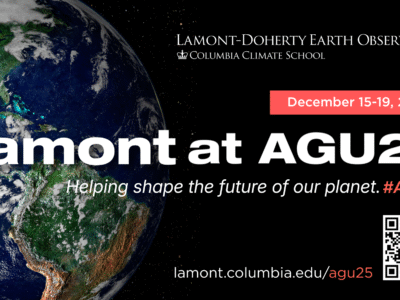This is the fourth of a continuing series of essays and interviews from Earth Institute scientists on the prospects for a global climate-change treaty. Check with us daily for news and perspectives, and to make comments, as events unfold throughout the Copenhagen meetings.
 Two broad pieces must be part of any world climate agreement. The one you hear the most about so far is mitigation: cutting emissions of greenhouse gases. The other–perhaps more pressing–is adaptation: measures we must take to adjust agriculture, infrastructure and economies to changes already happening.
Two broad pieces must be part of any world climate agreement. The one you hear the most about so far is mitigation: cutting emissions of greenhouse gases. The other–perhaps more pressing–is adaptation: measures we must take to adjust agriculture, infrastructure and economies to changes already happening.
We do not have to look to the distant future to be concerned about climate; we can see the impacts of climate-related events, including droughts, floods and cyclones playing out all the time, every year, right now. Working toward a deal in Copenhagen is crucial, but we can’t afford to wait for one to be signed; people are suffering and need solutions now.
The institution I work for focuses on adaptation, or what we call climate risk management–an idea that encompasses both adaptation and reducing the risk of disasters. Often, the populations most vulnerable are the poorest; they have contributed little to the problem, and yet will suffer the most. We develop solutions to help societies better manage such risks, in particular by recognizing that climate information, in and of itself, is a valuable resource.
In east Africa subsistence farmers may lose entire crops in drought years. They have few assets, so to survive the season they might have to sell what little they do have, including their cattle. Because of their vulnerability, lenders will not extend credit to them. It’s a classic poverty trap, facing many farmers in the world. Climate change, which is expected to increase the frequency of droughts, is expected to exacerbate it.
One solution is crop insurance, but the poor historically have not had access to it. Companies consider the risks too high, and someone has to go and check fields to assess individual losses—a costly process that adds to premiums already a stretch for people in developing nations. As an alternative, we are working with our partners to extend an innovative buffer called index insurance. With index insurance, payouts are based not on measurements of losses, but rather on measurements of weather, such as rainfall, which is correlated to loss. Transaction costs are low, as individual crops don’t need to be assessed. Through this program, in Ethiopia, farmers now have access to insurance and loans. We are now working closely with the Munich Climate Insurance Initiative to ensure that such insurance is included as one of the key pieces of the ‘adaptation’ text of any international climate agreement.
We also work in west and central Africa, an area that frequently suffers floods and droughts. Youcef ait Chellouche, director of the Red Cross for this region, asked if we could provide earlier warnings, in order to reduce suffering. In 2008, we gave him information that showed a strong chance of above-average precipitation for the upcoming rainy season. Rather than wait for the flooding to happen, Youcef appealed to international donors for resources; this allowed him to put supplies in place weeks before any event occurred. The appeal broke new ground because it was based solely on the threat of future flooding, derived from seasonal forecasts. As it turned out, there was no major emergency in any one country. But disaster managers were much better placed to deal with the widespread smaller ones that did occur, especially in Benin and Togo.
Finally, we work with researchers and water managers in South Africa to look at alternative solutions in light of climate and other factors. Here, water is scarce, and competition is already high among urban, rural and agricultural users. There has always been risk– but population has doubled in the past 40 years, and land use is changing dramatically. Now climate– a direct driver of water distribution– is shifting. Unfortunately, everyone agrees that climate change scenarios have limited usefulness for making real, local decisions; the information is too coarse, both in space and time. But over the next 20 years, flexible solutions, such as water markets, may help avoid damage through better allocation of resources. Market-based pricing in areas of limited water availability could persuade people to implement cost-effective conservation measures.
It is clear that we need a global agreement to face the future. But with many people already facing the challenge of climate change, research institutions have a valuable role to play. We can gather data, transfer knowledge and create solutions targeted towards those who will be hit hardest.
Molly Hellmuth is a research scientist at the International Research Institute for Climate and Society.




[…] years, negotiators have focused increasingly also on minimizing the impacts of climate change by adapting infrastructure and economies. The disciplines underlying these goals range from atmospheric science and oceanography to ecology […]